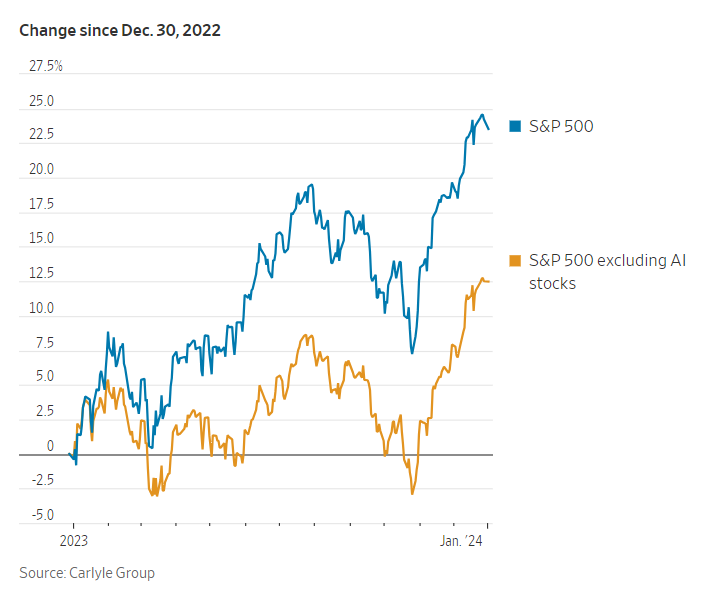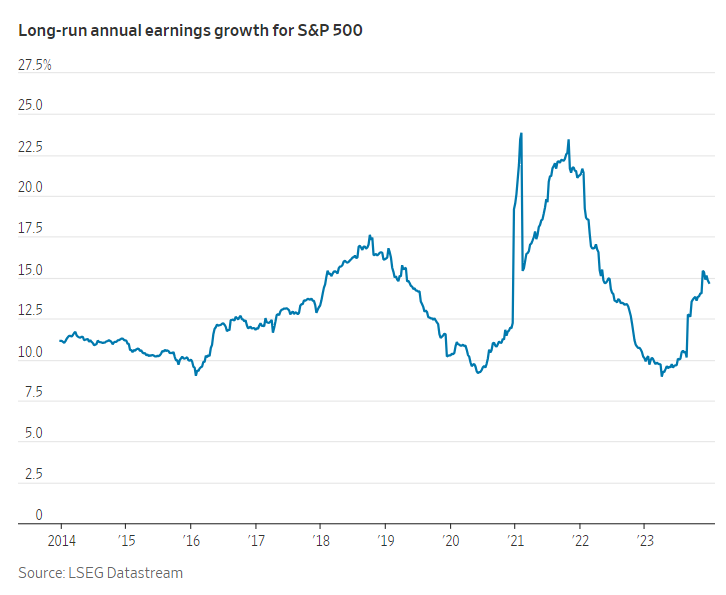
By Greg Ip
Jan. 4, 2024
It is time for an optimistic take on the economy. I’m not talking about whether inflation keeps coming down, or recession is avoided. Rather, I’m talking about progress on some of humanity’s most intractable challenges: artificial intelligence, illnesses such as Alzheimer’s, obesity and climate change.

Michael Nagle/Bloomberg News
Americans are pessimistic these days, and I don’t expect to change their minds. Exactly five years ago I wrote that the world was getting relentlessly better. In the years since, pandemic, war and inflation have left a lot of the world sicker, poorer and angrier.
And frankly, “techno-optimism” hasn’t been vindicated in a while. The last breakthrough to move the needle on economic growth was the consumer internet over two decades ago. You won’t find the impact of robotics, electric cars, drones, virtual reality or 3-D printing on economic growth or productivity. Cryptocurrency has been a net negative. New drugs hit the market each year, but between suicides, opioid overdoses and Covid-19, life expectancy, by the most popular measure, is lower than in 2019.
An influential study by four economists in 2017 concluded that ideas that generate economic growth are becoming harder to find. “I wander around MIT, it feels like there are a million innovations going on—but you don’t see that in the numbers on productivity or wage growth,” one of the authors, John Van Reenen of the Massachusetts Institute of Technology, told me this week.
So history militates against the innovations of the past few years making that much difference. And yet something feels different.
Take the most obvious: generative artificial intelligence, which lies behind ChatGPT and other systems that solve complex challenges in natural language. In just a year, it has become an essential tool to countless everyday workers, students and creators. That so many—from management consultants to Hollywood writers to journalists—are afraid of losing their jobs to AI speaks to its potential.
AI was one of the main drivers of last year’s surprise stock rally. Without roughly 40 AI-related stocks, the S&P 500 would have risen 12% since the end of 2022 instead of 24%, according to Carlyle Group.
To be sure, AI stocks might be in a bubble. Internet stocks were back in 2000 as well. But the economic benefits were real: annual productivity growth doubled to about 3.5% from 1997 to 2003.
Surprisingly, productivity also recently accelerated, to 2.4% in the year through September. Given its volatility, you should not read too much into that data, certainly not the impact of AI. Still, perhaps coincidentally, around the same time, stock analysts started raising their estimates of long-run annual earnings growth for the S&P 500, from 10% to nearly 15% now, according to LSEG Datastream.
Innovation’s true value, though, isn’t in raising gross domestic product or stock prices but in improving human welfare, and on that front, the progress goes beyond AI.

For example, last year the Food and Drug Administration approved, and Medicare agreed to pay for, lecanemab, the first drug shown to slow the advance of Alzheimer’s. Another, donanemab, could be approved soon.
They represent “a breakthrough for which neuroscientists have strived for decades,” Jeffrey Cummings, an Alzheimer’s expert at the University of Nevada, Las Vegas, wrote last year.
Also last year, Ozempic and other drugs that mimic GLP-1, a hormone involved in regulating hunger, revolutionized the treatment of obesity. Just last month, the FDA approved the first cell-based gene therapies for sickle-cell disease, an inherited blood disorder most common in Black Americans that can lead to disability or death.
And while their immediate benefit might be limited, these therapies open pathways to countless others. Messenger RNA, used to produce vaccines for Covid-19, is being used to develop vaccines for malaria, tuberculosis and HIV. The mechanism behind Ozempic might help cure cocaine, opioid, nicotine or alcohol addiction. These are some of modern society’s most intractable health problems. That is why the reported decline in life expectancy is misleading; children born today will almost certainly live longer than any other children in history.
The technologies behind the Alzheimer’s and obesity treatments are well established, whereas Crispr, the gene-editing tool used in the sickle-cell treatment, like mRNA, is relatively novel. Yet like generative AI, these therapies emerged now because, to paraphrase Isaac Newton, they stand on the shoulders of giants: the insights gleaned from years and billions of dollars spent experimenting with different technologies and targets.

AI and drug development have already crossed paths; AI is uniquely suited to finding promising proteins or genes to combat diseases out of reams of data. Stanford University economist Erik Brynjolfsson said AI is a “tool to think of things you haven’t thought about—a new kind of protein, art or music, the design for a building or a piece of equipment.” By accelerating the discovery process, AI might not deliver just a one-off boost to economic output but permanently raise its growth rate, Brynjolfsson said.
To be sure, beyond AI and medicine, technological advancement was less breathtaking last year. For example, progress on electric vehicles and renewable electricity stalled.
And yet breakthroughs are a game of probabilities, and the range and magnitude of bets on energy keep growing—in wind, solar, batteries, hydrogen, geothermal, carbon capture and storage, small modular nuclear reactors, and even fusion.
Van Reenen said new ideas can still be found—it just takes a lot of researchers and money, as the Covid-19 vaccine demonstrated. Similarly, “We have been putting a lot of resources into trying to deal with the problem of climate change. That creates the opportunity to make a difference.”
Write to Greg Ip at greg.ip@wsj.com
Dow Jones & Company, Inc.



